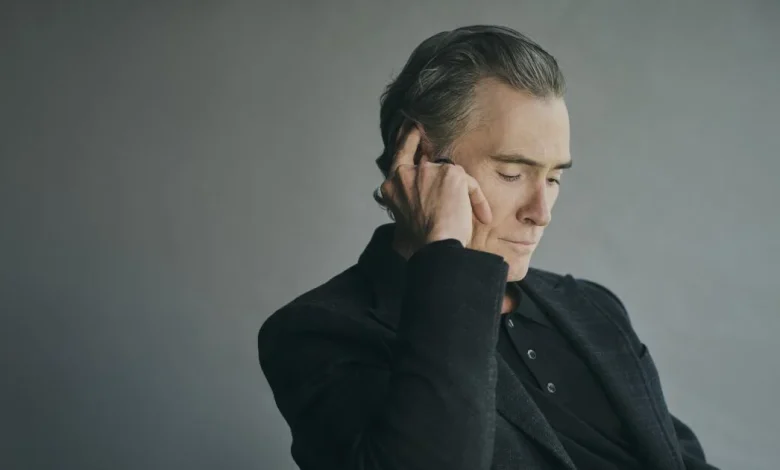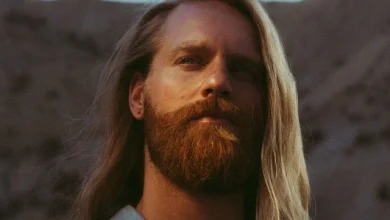How Billy Crudup turned an 8-minute scene in ‘Jay Kelly’ into the performance of his career

Billy Crudup knew the first time he read it that the part was nearly impossible.
In Noah Baumbach’s sharply funny, at times melancholy Hollywood satire “Jay Kelly,” George Clooney plays an aging movie star reckoning with what his success has cost him. Early in the film, a chance reunion with an old acting-class buddy named Timothy, played by Crudup, sends him into an existential tailspin of doubt and regret.
In just two scenes and roughly 10 minutes of screen time, Crudup’s Timothy — once a promising actor and now a child therapist who long ago walked away from the business — has to rekindle a friendship, surface decades of envy, swing from reminiscence to resentment and pick a fight that devolves into clumsy fisticuffs. The centerpiece is a moment in which he performs a Method reading of a dinner menu that dissolves into sobbing.
On paper, it’s the kind of sequence that could go wrong in a hundred ways.
“I was like, ‘F—, that’s really hard to execute,’” Crudup, 57, says with a self-deprecating laugh over Zoom from his New York apartment, wearing a hoodie and baseball cap. “I really wanted to be in one of Noah’s movies, but that particular stunt has a high degree of difficulty. The whole scene is like a novella. And the narrative is predicated on it working. It has to.”
Billy Crudup, left, and George Clooney in the movie “Jay Kelly.”
(Wilson Webb / Netflix)
Against all odds, it does, and then some. “Jay Kelly” (in theaters Nov. 14; on Netflix Dec. 5) is anchored by a starry ensemble, including Clooney as the conflicted leading man, Adam Sandler as his steadfast manager and Laura Dern as his long-suffering publicist.
Yet what’s lingered most from early screenings is Crudup’s tightrope act in that single restaurant scene, climaxing with a tearful reading of a menu — “truffle parmesan fries, brussels sprouts with balsamic honey glaze and bacon, wedge of iceberg lettuce…” — that somehow plays both absurd and painfully human, hinting at the actor Timothy might have become if life had gone differently.
Baumbach, whose films such as “The Squid and the Whale,” “Marriage Story” and “The Meyerowitz Stories” have long examined the tensions between ambition and intimacy, sees Crudup’s work in “Jay Kelly” as part of that continuum.
“Every time it’s screened at a festival, he gets applause for that scene,” the director says by phone, still sounding a little amazed. “I don’t think I’ve ever had that happen before. But I get it. You’re watching an actor be great and letting you into his process. It’s like a magic trick. He shows you just enough of how it works that it becomes even more astonishing.”
It’s an irony not lost on Crudup, a journeyman actor long admired for his craft and emotional precision, now drawing renewed attention for playing a man defined by the life he didn’t get. Over nearly three decades, Crudup’s career has spanned everything from “Almost Famous,” “Big Fish” and “Watchmen” to “Jackie,” “Spotlight” and the Apple TV series “The Morning Show.” Along the way, he’s collected a Tony for “The Coast of Utopia,” two Emmys for “The Morning Show” and a Screen Actors Guild award as part of the ensemble of “Spotlight.” Yet somehow, he’s never received an Oscar nomination.
“Every actor has Timothy moments,” Crudup says. “There have been innumerable parts I wanted profoundly that I didn’t get. And some of the parts I got were only because people dropped out. Brad Pitt dropped out of ‘Almost Famous.’ Keanu Reeves dropped out of ‘Watchmen.’ I’m standing by — I’m on the bench. At a certain point, if you have been able to have no other source of income other than your creative work, that’s a major success.”
As co-written by Baumbach and Emily Mortimer, the reunion between the two former acting buddies starts warm but quickly begins to curdle. What starts as nostalgic camaraderie turns volatile when Timothy recalls the role they both auditioned for decades earlier, the one that made Jay famous, leaving him behind. “You stole my job and you stole my girlfriend,” Timothy says bitterly. “At 23, I didn’t have much more than that.”
But the moment that gave Crudup the most anxiety was the menu reading, a playful but loaded challenge from Jay that turns into something raw. Since Crudup isn’t a Method actor, unlike Timothy, he had to find his own way into the scene.
“There’s a couple different layers of difficulty,” Crudup says. “First, pulling back the curtain, showing somebody how one might work. Also, it’s not how I work. So, how do I play a guy who’s like me, who’s an actor, but shows them something different?”
At first, Crudup tried to talk Baumbach out of the stunt. He suggested that instead of reading the menu, Timothy might riff about how actors chase emotional catharsis, turning the moment into a commentary rather than a performance.
“He told me, ‘I work a different way. Maybe we could do it this way,’” Baumbach recalls. “I listened, but I just felt like he could do it, so I didn’t do anything about it. Billy, like many great actors, tells you all the reasons why they can’t do it — and then does it amazingly.”
“Billy, like many great actors, tells you all the reasons why they can’t do it — and then does it amazingly,” says “Jay Kelly” director Noah Baumbach.
(Bexx Francois / For The Times)
About two weeks before shooting, realizing the script hadn’t changed, Crudup decided he had to figure it out.
“There’s a virtue in getting older — you’ve been humbled so many times that you don’t mind being curious about learning new skills,” he says. “So I started reading everything I could about Method acting. It’s not something you just pick up overnight. People spend years dedicating themselves to it.”
His way in was sense memory. “If therapy is a way to heal the trauma, sense memory is a way to reopen it,” he says. “You revisit a moment in your life when you had the same physiological response your character is supposed to have, get that going in your head and then just use the language of the script. And truthfully, it’s not great fun. I don’t know why people pursue acting this way.”
Baumbach shot the Chez Jay sequence over two days, keeping the camera close enough to catch the tears. When it came time to shoot the reading of the menu, Crudup warned Clooney that some real emotion might spill out.
“I told George, ‘I’m about to say some things out loud and they’re kind of personal,’” he says. To ground himself, he thought about his grandfather, a memory that quickly broke through whatever distance he’d tried to keep. “I’ll tell you, that sense memory s— works,” Crudup says. “I couldn’t stop crying the whole day. I went home, called my wife [the actor Naomi Watts] and said, ‘I can cry at anything now.’”
For Crudup, Timothy isn’t a bitter powder keg but a man looking for a little closure, someone who has made peace with the past until the moment he doesn’t get the apology he’s expecting.
“The choice that was made was that he was in a great place, actually, in his life,” he says. “He was genuinely happy to see Jay and he was probably happy to put that chapter behind him. Having a nice moment where Jay apologizes would have been great. But Jay doesn’t — and it flips the switch.”
Baumbach calls that dynamic the movie’s hinge, with success and failure feeding the same insecurity, a tension he’s mined before in “Greenberg” and other films about people stalled between ambition and regret. “I’ve explored versions of the Timothy character in a lot of my movies — people who define themselves by the fact that they didn’t become some fantasy version of themselves. That’s remained a barrier between them and happiness.”
Inhabiting Timothy’s vulnerability made Crudup think about his own early years, when he tried to establish himself while keeping the machinery of stardom at arm’s length. After earning his MFA from NYU’s Tisch School of the Arts in 1994, he made his Broadway debut the following year in Tom Stoppard’s “Arcadia” at Lincoln Center, sharing the stage with actors he’d long admired from afar. “You’re living the good life,” he says. “And I wanted to protect that at all costs.”
Crudup tried to preserve some sense of mystery. “When I was starting out, I remember people wanted me to do press and I was like, I don’t want to do press,” he says. “Why would I tell anybody anything? I don’t know s— about Meryl Streep. I don’t have any idea who Robert De Niro is.”
By the late 1990s, on the strength of his breakout performance in “Jesus’ Son,” magazines were calling him the next big thing. The 1999 indie drama, adapted from Denis Johnson’s short-story collection, cast Crudup as a drifting addict known only as FH, a role that earned him an Independent Spirit Award nomination. A year earlier, he had starred as Olympian Steve Prefontaine in “Without Limits,” confirming his range and making him one of Hollywood’s most closely watched young actors.
Crudup saw the trap. “There was a whole industry around that ‘it’ thing,” he remembers. “Having potential is not the same thing as delivering. I was trying to be a part of things that were going to have broad appeal. I was interested — just not in somebody else’s idea of success.”
Billy Crudup in “The Morning Show”
(Erin Simkin / Apple TV)
What mattered was the acting itself and the feeling, watching his own films, that he hadn’t yet mastered it. “I looked at my work on film and thought, that wasn’t as good as I wanted,” he says. “There’s more I need to learn about how to be effective on camera.” That hunger kept drawing him back to the stage, where he’s since spent decades testing himself in front of live audiences in productions such as Tom Stoppard’s “The Coast of Utopia” and “The Invention of Love,” as well as “The Pillowman,” “Harry Clarke” and “No Man’s Land.”
Now, after “The Morning Show” and “Jay Kelly,” Crudup seems to have found the balance he was chasing, a kind of creative renewal without the pressure to reinvent himself. His turn as a slick, sharp-tongued network executive on the Apple TV series has earned him two Emmys and a new wave of recognition, while Baumbach’s film reconnects him to the kind of searching, emotionally exposed work that first made his name.
“I feel more successful than I could have ever imagined,” he says. “And I’ve been able to sustain a career doing interesting work. That was always the goal.”
Crudup has spent most of his adult life in New York and he says the city still grounds him. “It’s inspiring creatively because everyone is clustered together. You can’t avoid anyone. Plenty of people don’t care who you are or whether your scene study class went well. It’s the great equalizer.” He still goes out to see friends in plays, often the same circle he started with decades ago. “It just feels like another night out,” he says. “The same group of people, the same kind of night, 30 years later. I feel incredibly gratified by that.”
As for the recognition surrounding “Jay Kelly,” Crudup takes it in stride. The film’s questions about what success means and what it costs are hardly lost on him.
“There’s no stage at which profound public rejection isn’t in the offing,” he says, dryly. “You don’t get the callback, you don’t get the part, you get cut out, you’re good but nobody sees the movie, you’re good, everybody sees it and you still don’t win. Or you do win — and six months later people go, ‘What are you doing these days?’”
He smiles, remembering how early on, people in the business tried to polish him into something closer to their idea of a Hollywood leading man. He recalls a time when the head of his talent agency called him in to discuss his name.
“I thought, oh no, she’s coming after Crudup,” he says. A name that begins with “crud” and that people still routinely mispronounce (for the record, it’s CREW-dup) was never the obvious one for a movie star.
“But she says, ‘What do you think about William? When I think of Billy, I think of Jimmy Carter’s brother and Billy Beer.’ And I was like, ‘Where the hell are you pulling that from?’” He pauses, faintly incredulous. “I told her, ‘I think I’m just kind of a Billy.’”
After all these years, he still is.





